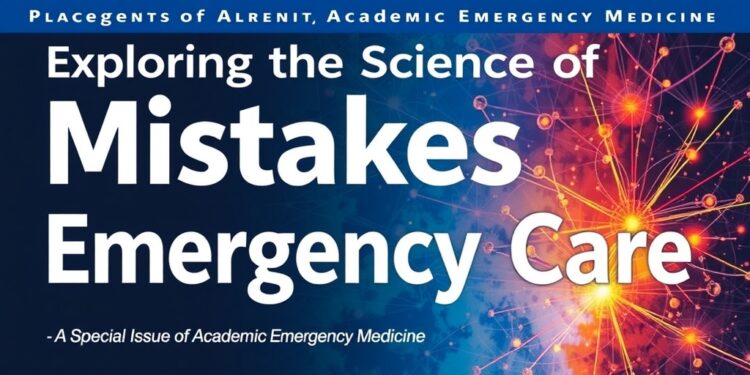Des Plaines, IL — The realm of emergency medicine is undergoing a critical evolution as evidenced by the recent publication in Academic Emergency Medicine (AEM). This edition significantly delves into the often overlooked but critical area of diagnostic errors in emergency care. Supported by the Agency for Healthcare Research and Quality (AHRQ), this March issue presents a collaborative effort among leading researchers and healthcare professionals deeply invested in identifying and mitigating errors that can lead to detrimental patient outcomes.
The impetus for this focused examination arises from landmark findings presented in the 2015 National Academies report titled “Improving Diagnosis in Healthcare.” Since its release, awareness surrounding the prevalence of diagnostic errors has significantly heightened. Such errors, which may manifest as missed, incorrect, or delayed diagnoses, are not confined to emergency medicine alone but rather are a pervasive concern across all medical specialties. Emergency departments, however, are particularly susceptible to these challenges due to their inherently high-stakes, time-sensitive environment marked by resource constraints.
In this special issue, AEM showcases a range of scholarly contributions, including ten original research reports, three special contributions, one systematic review, two research letters, and a collection of commentaries and reflections. Each piece is meticulously organized around several core themes, including cognitive processes in healthcare providers, communication flaws that contribute to errors, and specific error-prone conditions highlighted in emergency medicine. Notably, there is also a contribution investigating the promising role of artificial intelligence in reducing diagnostic errors, a topic that is generating significant interest in contemporary healthcare discussions.
Jeffrey A. Kline, MD, the Editor-in-Chief of AEM, emphasizes that the insights presented in this issue underscore the necessity of shifting the discourse surrounding diagnostic errors. He advocates for a departure from a culture of blame, urging practitioners to view errors through a more holistic lens. “Errors arise not merely from individual oversights but are influenced by a multitude of complex factors,” Dr. Kline states. He highlights systemic challenges, knowledge gaps, and failures in communication as pivotal contributors to the diagnostic dilemmas faced in emergency settings.
The special issue reflects a concerted effort, spearheaded by Dr. Kline alongside distinguished guest editors Richard T. Griffey, MD; Brandon C. Maughan, MD, MHS, MSHP; and Margaret E. Samuels-Kalow, MD, MPhil, MSHP. Their collaborative leadership has been instrumental in guiding research and scholarship that aims to propel advancements in emergency care. Through their expert curations, the issue aspires to acknowledge the complexities inherent in emergency diagnostics while providing actionable solutions that can benefit the field at large.
Furthermore, anthropological studies reveal that healthcare providers frequently operate under tremendous pressure, which can aggravate the frequency of diagnostic errors. The high turnover of patients in emergency departments creates a perfect storm for potential misdiagnoses. This environment necessitates rigorous training and systems thinking to root out the causes of errors rather than merely addressing the symptoms.
Additionally, the emphasis on communication within healthcare teams is paramount. Poor communication has been identified as a significant contributor to diagnostic failures in emergency medicine. Enhancing interprofessional collaboration and ensuring clarity in the exchange of information among providers have been essential steps outlined in the new research. Training programs that foster these skills are becoming increasingly relevant in a landscape where timely and accurate diagnosis is critical.
Amidst the discussions of human factors, the exploration of artificial intelligence presents new hope. As described in one of the special contributions, AI has the potential to act as a supportive tool for healthcare providers, streamlining the diagnostic process and assisting with decision-making. This aspect has the potential to reduce the reliance on individual recall alone, which can often be a source of error under pressure.
The systematic review included in this issue delves comprehensively into existing research, revealing patterns and trends that underscore the need for systemic improvement across emergency departments. Identifying these trends equips healthcare professionals with the knowledge to implement targeted strategies aimed at minimizing diagnostic errors. With a clearer picture of where the most common misunderstandings and oversights occur, practitioners can better allocate resources and training to improve outcomes.
As the discussion around diagnostic errors continues to evolve, it is vital to remain proactive and vigilant. The issues surrounding diagnostic failures in emergency settings are not insurmountable, but rather call for a renewed commitment to interdisciplinary collaboration and innovation within healthcare systems. By fostering an environment that prioritizes education, system-based solutions, and the integration of technology, the goal of reducing diagnostic errors becomes increasingly attainable.
In summary, the March issue of Academic Emergency Medicine serves as an essential resource for understanding the multifaceted challenges of diagnostic errors in emergency medicine. The compilation of research and discussion presented in this edition is invaluable for clinicians, educators, and policymakers alike. As the healthcare landscape continues to change, the findings presented in this special issue will undoubtedly resonate within the field and help pave the way for better diagnostic practices that ultimately improve patient safety and care outcomes.
Through such scholarly pursuits and discussions, we can not only keep the conversation alive but can also expand our collective understanding of the issues at hand. This issue acts as a stepping stone towards cultivating a culture of safety and accountability in emergency medicine, one where errors are openly discussed, learned from, and addressed through cooperative effort.
Subject of Research: Errors in emergency care, focusing on diagnostic errors.
Article Title: Special Issue on Diagnostic Errors in Emergency Medicine
News Publication Date: 18-Mar-2025
Web References: Academic Emergency Medicine
References: None available
Image Credits: None available
Keywords: Health and medicine, Emergency medicine, Clinical research, Diagnostic errors, Healthcare systems.




